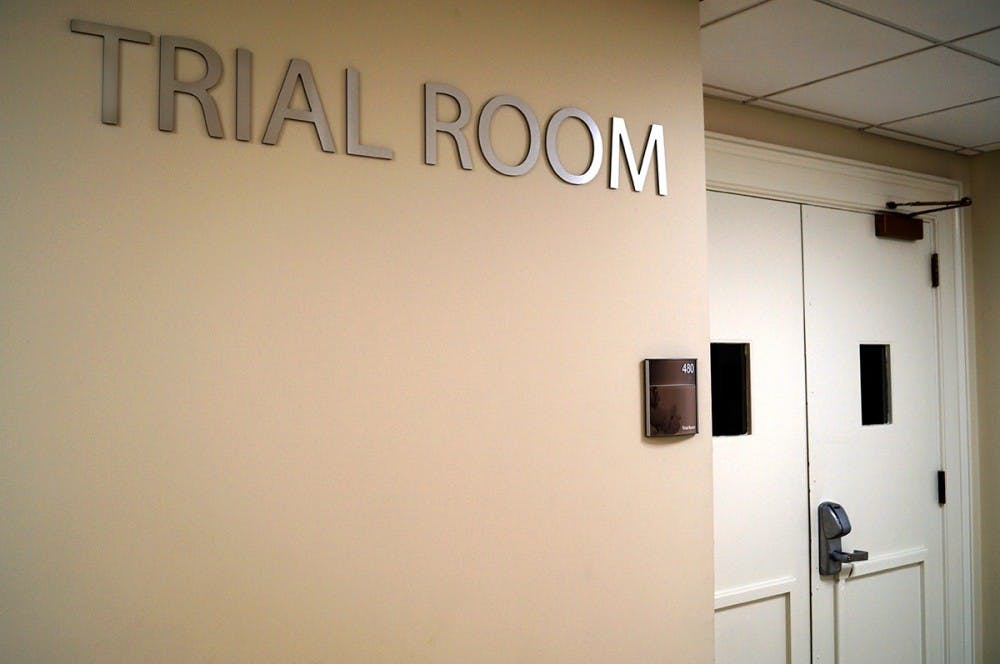Lea en español
New COVID-19 pandemic-related guidelines forced the University Judiciary Committee to adjust its operations earlier this summer. For that reason, fourth-year Batten student Gabby Cox, who chairs the Judiciary Committee, said the line of communication between the Office of the Dean of Students and the UJC has been constant.
“We were both dealing with a similar problem of trying to figure out how to adjudicate cases that may come through,” Cox said. “They are and always have been a great resource for us. You can’t really adjudicate the legislation created by the administration without having constant communication within these processes.”
Since students and faculty returned to Grounds for partial in-person instruction earlier this month, the UJC and ODOS have begun fielding cases of student noncompliance with COVID-19 related regulations. The details of those cases are confidential, but Dean of Students Allen Groves said in an email to The Cavalier Daily that all issued suspensions have been interim.
"The University is not keeping a running tally of all reports across platforms as the intention is to respond to the reports as they come in rather than compile them,” said Wes Hester, deputy spokesperson and director of media relations for the University. “Many reports are duplicates and many are immediately closed due to lack of information. Some others are outside the University’s jurisdiction.”
The reporting process for cases of COVID-19 noncompliance is the same as it would be for standard disciplinary cases. Reporters submit complaints through either the UJC website, Just Report It or SafeGrounds. All three systems require reporters to sign in with their University computing ID through NetBadge or at least leave their contact information if they’re not affiliated with the University.
After a complaint is filed, the Committee reviews the incident and decides whether it has jurisdiction over the case. If it does, the accused student is assigned a case number, a trial date, a location and a UJC Counselor. In addition, accused parties must meet with a UJC Investigator to share their version of the incident. At trial, students can plead not guilty to move the hearing into a Trial for Guilt or plead guilty and move the hearing into a Trial for Sanction.
To handle a caseload described as “higher at this point in the semester” than it has been in others, the Committee has changed its operations to conduct the entire process virtually when necessary. If students do not want to appear at a trial in-person, they have the option of appearing in a somewhat modified Zoom room that both restricts who can enter and does not monitor private chats between participants. Much like the typical audio recordings that the UJC keeps of proceedings for its records, virtual trials will also be recorded and saved for archival purposes. Paperwork has migrated to a virtual platform as well, as all case information is stored securely on Microsoft Teams, where the UJC can control exactly who has access to view certain documents.
While the organization is ready to handle more cases on all fronts, Cox said that she hopes students can continue to pull their own weight in upholding University guidelines on their own by holding each other accountable.
“I understand that students may be uncomfortable confronting others, but it’s really useful if they see another student not masking, or if they see a group of 16 students on the Lawn, to walk up to them and ask them to [put a mask on] or [break into smaller groups],” Cox said. “I’ve seen quite a bit of that and it’s been pretty civil conversation.”
The University updated its COVID-19 guidelines Sept. 22 to further restrict in-person gatherings to no greater than five people, prohibit travel to and from Charlottesville and mandate mask-wearing whenever not in one’s bedroom or while exercising outside or in accordance with guidelines at an IM-Rec facility.
Such informal interactions may work for isolated or unintentional incidents, but the UJC stands by its position in earlier reporting from The Cavalier Daily that “the level of severity in a reported case will determine if a response is necessary.” However, that level of severity can vary depending on the broader context of a situation. Less serious cases of noncompliance may result in a conversation with ODOS while more serious or repetitive offenses can result in UJC Investigation and Trial that could culminate in interim suspension.
“You can not be wearing your mask around one time, and that can be considered infrequent. But if you consistently have that behavior, that’s when you’re putting others at risk, and that’s when it becomes a more major problem,” Cox said. “[On the other hand], you could not do something frequently and really spur a major event that is reckless to the health and safety of other students.”
While Dean Groves has stated that the “most serious and flagrant violations” are those that violate the school’s restrictions on large gatherings, the UJC believes that all COVID-19 related regulations are important because refusal to wear masks, socially distance and adhere to gathering size limits all constitute violations of the University of Virginia Standards of Student Conduct, specifically standards two, six, 10 and 12, which stipulate that students should not engage in “conduct which intentionally or recklessly endangers the health or safety” of others, violate “University policies or regulations,” violate “Federal, State, or local law,” or fail to “comply with directions of University officials.”
“There was a lot of hard work over the summer by student groups and administration of making COVID policies more of a social norm,” Cox said. “That doesn’t always work, so you have to have punitive processes in place to deal with situations that aren’t complied with. If you look at U.Va. as an institution compared to other institutions in Virginia, we seem to be having a generally good response to what’s going on.”







